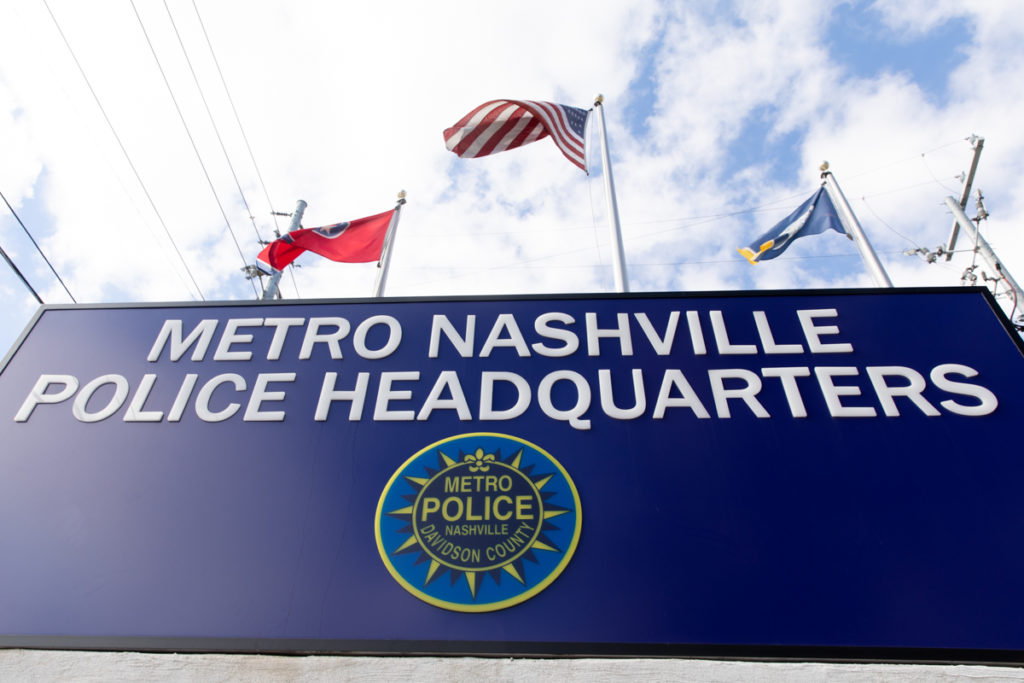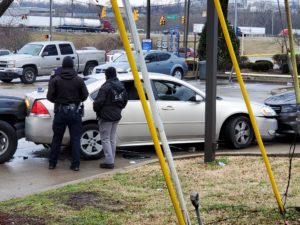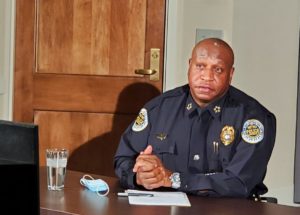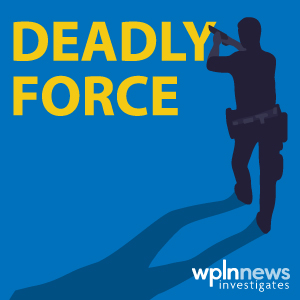
The Nashville police officers involved in a shooting last week that injured a robbery suspect had recently been assigned to a new intelligence-driven team that’s received hardly any publicity. It’s one of multiple initiatives launched under the Metro Nashville Police Department’s new leadership.
The officers are tasked with investigating everything from violent crime to nuisance complaints. But the unit, with a wide scope of responsibilities, has until now flown under the radar.
The team resembles several proactive initiatives that have come and gone at MNPD over the years, following criticism from community members for their aggressive enforcement tactics. A shooting in the new team’s first few weeks of existence stands in stark contrast to Chief John Drake’s commitment to what he calls “do no harm” policing.
According to the Metro Nashville Police Department, the Community Field Intelligence Team (CFIT) uses “intelligence-driven policing” to help detectives and patrol officers with investigations at multiple precincts. And though its focus is violent crime, the team also investigates “complaints at nightclubs and similar establishments where crime is prevalent,” as well as “simple drug complaints,” according to a description shared by the department.
 Courtesy Metro Nashville Police Department
Courtesy Metro Nashville Police Department Officers from MNPD’s new Community Field Intelligence Team stand near the scene of a shooting that wounded a robbery suspect last week.
At a press conference with Mayor John Cooper on Monday, Drake said the CFIT had replaced the department’s Crime Suppression Units, which he described as a “proactive measure that would go in and saturate neighborhoods.” In contrast, Drake said the goal of the CFIT, which has a branch at each precinct, is to “develop intelligence in a do no harm approach to communities, identifying problem people in problem areas and then trying to make an arrest or do some type of intervention.”
On Monday, Drake discussed several other steps to amp up enforcement and crime-solving measures, including:
- A centralized homicide unit, formed last year to share resources among precincts in order to increase MNPD’s homicide clearance rate;
- Six new TITAN teams, which bring together officers and detectives from the now-disbanded gang unit and juvenile crime task force to investigate neighborhood shootings;
- An additional patrol shift that will deploy 80 extra officers on the streets between 5 p.m. and 3:30 a.m., when the majority of violent crime occurs.
But Drake has said he doesn’t want to focus just on violent crime. He has also committed to strengthening relationships with community members. In an interview last month, Drake told WPLN News the department’s new community engagement efforts were his proudest accomplishment so far as chief.
“We’re getting out into vulnerable neighborhoods and people are getting to know us,” Drake said. “More importantly, we’re getting to know them. And it’s building trust. It’s building legitimacy in those neighborhoods.”
Addressing mistrust
Initiatives like the Community Field Intelligence Team exist to investigate violent crime — and other illegal activity police might encounter along the way. But they will also test the department’s ability to balance community-police partnerships with long-standing norms in law enforcement training and culture.
At Monday’s press conference, Drake touted his diverse community engagement team, which brings together Black, Latino, Kurdish, and LGBTQ officers to forge relationships with communities that have historically mistrusted law enforcement.
Drake also said he’d appointed Commander David Imhoff to lead a new Office of Alternative Policing Strategies. It will partner with the mayor’s office, the juvenile court, mental health providers and nonprofits to work with youth and other vulnerable individuals traveling down a path toward serious criminal activity. And, after years of delays, the chief said he expects all officers to be equipped with body and dash cameras by September.
 Courtesy Metro Nashville Police Department
Courtesy Metro Nashville Police Department Police Chief John Drake shares updates about the department’s new initiative to address crime and community distrust at a press conference Feb. 1.
Those announcements follow earlier steps from Drake to shift MNPD away from the proactive policing units that have garnered negative attention in the past.
Last fall, he instructed precinct commanders to dissolve their flex teams, which pulled officers off of 911 calls to instead attempt to deter crime before it happens. The program had allowed each regional police station to dedicate officers to the issues it deemed most pressing, whether it be robberies, car theft or break-ins. Drake asked commanders to replace those units with neighborhood engagement teams.
“We pulled these teams together, one, to have community engagement, to get to know people, let them get to know us, but, also, we can have communications and rapport to not only react to violent crime but to try to prevent it,” Drake said. “By having those communications with neighborhoods, then we can move forward with our way of reducing violent crime.”
But Drake told WPLN News last month that the biggest challenge facing the department is a surge in violent crime, which has risen across the country during the pandemic.
On the day of his appointment, Drake said he hoped to “smartly address violence, without creating a sense among residents of being ‘over policed.'” MNPD has struggled to walk that line with its proactive units in the past.
‘They’re literally occupying neighborhoods’
Perhaps the most well-known is the Juvenile Crime Task Force, which was created in 2018 to prevent teen violence.
The group came under scrutiny a few months later, when Officer Andrew Delke, who had just joined the task force two weeks earlier, shot and killed Daniel Hambrick during a foot chase. Delke was on the lookout for stolen guns and cars that day and believed that Hambrick was driving a stolen vehicle.
 Samantha Max WPLN News
Samantha Max WPLN News“It’s not about one person. It’s not about individual police officers,” Gideon’s Army founder Rasheedat Fetuga said at a press conference about defunding the police on June 13. “These are systemic issues that have to be changed, which is why we call for funding of restorative justice programs.”
“It really shows just how disconnected the city is from the issues that youth in Nashville face,” Rasheedat Fetuga told WPLN News last year, during reporting for the Deadly Force podcast. Her nonprofit, Gideon’s Army, strives to prevent youth violence through restorative justice, rather than policing.
“There are mixed feelings about the juvenile task force. There’s some people who think it’s great to get out there and get youth off of the streets and everything,” Fetuga said at the time. “But I think that the message that it sends is it doesn’t frame violence that is happening in the community as a public health issue. And violence in Nashville is an epidemic.”
MNPD’s now-defunct Operation Safer Streets program also received criticism for its proactive tactics. In an open letter published in January 2017, former Chief Steve Anderson wrote that the initiative brought together detectives and uniformed officers to investigate gangs, drug trafficking and violence in different locations each week.
But Black Lives Matter activists urged MNPD to disband the program, arguing that it disproportionately affected minority residents.
“We have statistics, every single week, that show us just how many people they’re stopping, and it’s always Black or brown neighborhoods,” organizer Joshua Crutchfield told WPLN News in 2016. “We can’t talk about trusting the police when they’re literally occupying neighborhoods where Black and brown people live.”
The department says the program, which launched in 2005, was discontinued in 2018. On Monday, Drake said he’d eliminated several other proactive teams “that some people thought led to over-policing.”
“We moved away from the old units that we had. We made these news ones,” Drake said Monday. “I think it’s going to be 21st century policing at its best, which is my goal, to be identified as one of the best police departments in the country.”
Samantha Max is a Report for America corps member.


